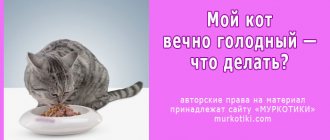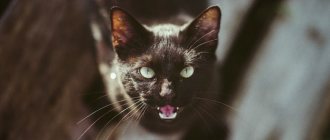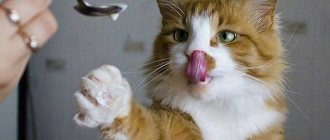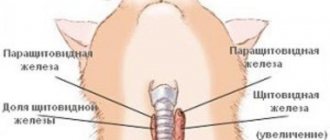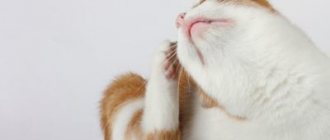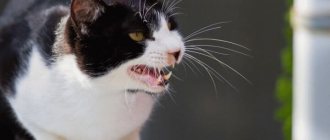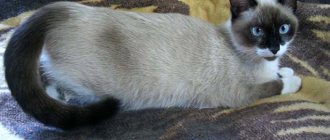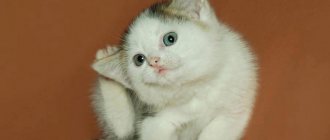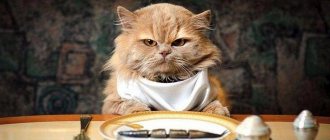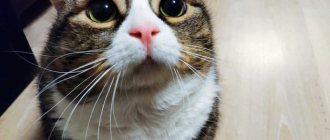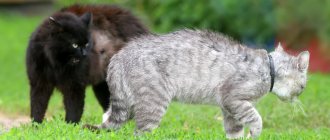While some cats suffer from decreased appetite, others have the opposite problem. An eternally hungry cat is a common occurrence. Owners observe how their pets require more than the permitted dose of dry food per day or natural food of more than 5-7% of body weight, that is, more than the average daily norm. Why is this happening? Is it necessary to supplement feeding if a hungry cat constantly asks for food? The answer depends on each specific situation. Here are some examples of reader questions on this topic.
Situation 1: a hungry cat does not eat up natural food; previously drying was always available
“My cat, until she was 2 years old, ate only dry food; it was always available. Now we have switched her to natural food twice a day and cannot feed her: she constantly asks for food throughout the day. Why does a cat always want to eat?
Over the course of 2 years, the cat got used to a diet where food was available all the time. Now she is limited to two meals, which is unusual for her and can even cause stress. Naturally, it is inappropriate to keep natural food available at all times; such nutrition requires 2-3 meals a day. However, the cat needs time to readjust. This takes from 1 to 3 months. At this time, if possible, you can divide the daily portion into 3 meals instead of two, and then, when the cat gets used to this regimen, remove the daily meal, again dividing it between breakfast and dinner. If it is not possible to feed three times a day, you will just have to wait until the body readjusts.
Article continues after advertisement
Cat nutrition standards
As you know, there are two types of cat food: dry and wet. Feed rates depend on age, breed, health status, and body weight. The last factor is the most significant.
Proper nutrition of animals is the key to their health
For your information! The daily intake of wet food is on average 5% of the animal’s body weight.
The amount of dry food is calculated taking into account the pet’s weight:
- up to 3 kg - 25 g;
- from 3 to 4 kg - 40 g;
- 4-5 kg - 55 g;
- with a weight of more than 5 kg - 12 g per 1 kg of body weight.
For the first 4-5 weeks, kittens eat only cat’s milk and determine the amount of food they need. Then small pets can be fed with high-quality dry and wet food, which is more balanced in composition than homemade food. Its quantity also depends on several factors.
Important! It would be best to use the dosing table, which manufacturers usually place on the packaging.
Situation 2: the cat does not get enough of two meals a day, previously he ate food twice a day
“My cat wants to eat all the time. The feeling that he simply does not get enough of natural food. When I was at the stern, I ate twice a day and didn’t ask for extra. Now he follows me around all day and looks at me with pitiful eyes. He eats 5% of his weight, that is, according to science. Does he really need more? What if he gets fat then? The cat asks for food - does it mean he’s missing something?
Most likely, this condition will pass some time after switching to a natural diet. Many cats are delighted with raw meat, because it is the right food, so at first they try to eat more. In addition, the body also needs to be rebuilt. There is a study that shows that by eating approximately the same food for 2-4 weeks, the cat gets used to it - and its body learns to regulate activity in accordance with the amount of energy supplied by the food. At the same time, the body gets used to a certain amount of food and learns to get enough of it. That is, a kind of adjustment of the body to the proposed type of nutrition occurs. The situation usually returns to normal within 1-3 months.
But it’s still worth analyzing the cat’s activity and condition. If you see a lack of body weight (ribs and spine stick out) or the cat is overly active, then perhaps he is missing 5%. Then the amount of food can be increased slightly or made more caloric. Lean pork, chicken heads, and poultry thighs with skin help with this.
If the cat is in normal condition, he is well-fed, and his activity is so-so, in addition, the animal is castrated, which is why it may also feel an excessive appetite, it does not need additional food. Then you can resort to tricks to better saturate your cat with food of the same calorie content. For example, if you serve meat in small or medium-sized pieces, try cutting them larger. When a cat has to try hard to eat the “prey”, work hard with its jaw, it takes longer - then the animal realizes faster that it is full. Similar mechanisms operate in humans. Secondly, active jaw activity is an important element of eating due to a number of neurophysiological reactions, which results in increased levels of happiness and decreased stress.
How to feed a kitten correctly
Exactly how much a baby should eat depends on his age. So, for the first two months the cat needs to be fed 5-6 times a day, the daily amount of food should not exceed 150 grams. In the period from 3 months to six months, the cat needs more food - up to 240 grams (four feedings a day).
At 6-9 months, the baby’s diet increases to 250 grams, but you need to feed it no more than 3 times a day.
At 10-12 months, when the period of active growth ends, in order for a cat to lead a normal life, it is enough to receive two feedings a day (morning and evening) with a daily intake of no more than 200 grams.
However, this scheme is not a dogma; it all depends on the individual characteristics of the organism, the breed and the principle of feeding - natural food or specialized feeds, the instructions of which always detail the number of meals and the daily norm.
It should be borne in mind that kittens require more protein, amino acids and some minerals than adult animals. The baby should receive a daily dose of protein - the main building material for the body - in the amount of 30% of the total food.
For the normal functioning of the gastrointestinal tract and the prevention of constipation, the kitten should always have free access to clean, fresh water.
Situation 3: the cat does not eat enough after changing food
“After the operation to remove the testicles, we switched the cat to castrate food, because this is considered correct. However, now he asks for food all the time. As soon as we return the old food, everything returns to normal, but we understand that we cannot feed it, because... castrati are prone to obesity. Why does the cat constantly ask for food? What to do?"
In fact, not all castrates gain weight after having their testicles removed. Many people do not even experience increased appetite, although this is rare. Feeding them regular food, not for castrati, is quite possible and, rather, even necessary. We discussed this situation in detail in another publication.
Health status
In most cases, cats that constantly beg for food have an underlying medical condition, and in many cases it may simply be a medical condition. One common condition that makes a cat seem hungry all the time is worms, and while none of us want to admit that our cat might have this condition, it is more common than you think, but it is treatable.
Worms can be acquired from a variety of places, especially if your cat likes to play outdoors or spend the night. However, your veterinarian can quickly determine if he has worms, and this is a relatively easy-to-treat and affordable process, usually in the form of oral medications.
© shutterstock
Feline diabetes may be another cause of increased appetite, scientifically known as diabetes mellitus, when the cat's body does not use insulin correctly or does not produce enough insulin. Diabetes can be identified, again by a veterinarian, through blood tests and a physical examination with laboratory tests, and can be treated.
Signs you may want to look out for as an owner may include excessive urination, excessive drinking of water, and constant begging, in which case you should make an appointment with your veterinarian as soon as possible. Moreover, you may find that even if your cat eats very well, she may be losing weight, which is another sign of diabetes.
Other health conditions that can lead to polyphagia can be acromegaly, which is an excess of growth hormone, usually resulting from a pituitary tumor, Cushing's syndrome, hyperthyroidism, inflammatory bowel disease, and even pregnancy in cats.
Almost all health conditions can be cured or managed thanks to advances in medicine, and your veterinarian can be your best friend in finding the cause of polyphagia in your cat. Your cat constantly asking for food may seem natural at first glance, but in reality there is always a reason for something unnatural, and it could be something as simple as a behavior you learned early on.
Situation 4: the cat began to eat too much after castration
“After we castrated our Marquis, he had a crazy appetite. He only thinks about food. He asks all the time. I have already improved significantly. We are afraid of obesity. Why does my cat always want to eat? Can I feed him even more or not? The cat is on a natural diet.”
You are right to be afraid of obesity, because if the cat passes on, such a fate is inevitable. On the contrary, a neutered male or female cat has a lower calorie requirement than a non-neutered one. Accordingly, there are no objective reasons for increasing the amount of food. Moreover, castrates, even without taking into account the overeating factor, are more prone to a loose body due to hormonal changes.
Nevertheless, the problem must be solved. The increased appetite of castrates is dictated by hormonal changes: now the cat’s body is guided in the feeling of satiety by whether the stomach is full or not. Therefore, the first possible solution is to add more vegetables to the meat than before, but still within the acceptable limits - 10-15% of the diet. Vegetables are practically not absorbed by the cat’s body, passing through the gastrointestinal tract in transit. However, vegetables immediately after eating give you a feeling of fullness, being a kind of ballast and taking up a lot of space. That is, during one meal, the cat consumes a larger volume of food, but the food does not become more caloric. This, by the way, is the basis of the operating principle of many foods for castrates; however, as a rule, they do not contain vegetables, but a lot of grains, which is cheaper but harmful. Therefore, it is better to prepare a natural menu.
In addition, you can use the trick described above, when the pieces of meat are served in large form, so that they take longer to bite off and take longer to digest. And finally, you can divide the daily portion of food into 3 meals without increasing its volume.
In general, I would like to once again draw your attention to the fact that constant begging is not a reason to open the refrigerator. Obesity is life-threatening, and it will definitely come to an animal that moves little, sleeps a lot and eats in excess.
Article continues after advertisement
Should I restrict my pet's food?
The packaging of the finished food shows approximate daily portions for animals of different weights and ages. Of course, there are individual characteristics, as well as uneven living conditions: cats walking outside, and even in winter, need more food.
Be sure to read:
How cats die: signs, behavior before death, how to alleviate the condition, what to do
Should I limit my food intake? Despite the fact that high-quality feed contains consumption limiters, a program is provided for obese animals in which the daily portion is significantly reduced. But what to do when a hungry cat starts meowing? Distract him with entertaining games.
Situation 5: a pregnant cat constantly asks for food
“Ever since my cat got pregnant, she has been eating a lot. I understand that pregnant women eat more. But how much more? How to calculate the norm?
The situation when a nursing cat constantly asks for food or a pregnant cat is always hungry is quite normal. During this period, all her juices are sucked by the kittens (either in the womb or when they drink their mother's milk). Therefore, pregnant and lactating cats are not limited in food - they themselves regulate the amount they eat.
How long should a kitten sleep?
When it comes to sleep, cats are big sleepers. An adult animal sleeps up to 18 hours a day. True, this only applies to pets who do not need to worry about food.
The kitten sleeps even more - up to 20 hours. This is due to the fact that his body is in the process of active development, the cat is gaining weight, spending a lot of energy, to replenish which he needs to eat and, of course, sleep. For example, a two-month-old baby eats 5-6 times a day. After eating, he falls asleep again for 2-3 hours and wakes up due to a feeling of hunger. The period of wakefulness in total takes no more than 4 hours.
The regime may be different - it all depends on the character and habits of the kitten. But in any case, the baby should not sleep less than 18 hours. So there is nothing wrong with the fact that a small pet sleeps a lot; on the contrary, it is well-fed, which means it is healthy.
If something worries you, it is advisable to take your baby to the vet to make sure everything is okay with him. If a specialist discovers any deviations, you need to immediately begin treating the little furry so as not to start the process.
Situation 6: old cat constantly asks for food
“I have an old cat who is always hungry - what should I do? This didn't happen before. We follow the lead and give more food, but the cat still lost weight.”
The answer to the question of why a cat is always hungry may be advanced age. Firstly, some older cats suffer from senile dementia (although in relation to cats it is more correct to say “cognitive dysfunction”), which is why their eating behavior may be impaired: their appetite can become either reduced or increased.
Secondly, if a cat wants to eat all the time, perhaps she actually wants affection and attention, and she associates food with these pleasant things. As you know, old cats need attention more than young ones.
Also, the reason for increased appetite in old people may be that with age, digestion begins to work sluggishly - and beneficial substances coming from food are absorbed less well. In addition, older cats may have reduced immunity, which results in the active development of worms. Often diabetes, which cats sometimes acquire along with excess body weight, causes increased appetite.
If you see that the cat is hungry all the time, but despite the fact that he is given food, he is losing weight, this is a signal - you need to see a veterinarian. Perhaps the fact is that the worms eat most of the nutrients. Perhaps the body itself does not absorb nutrients properly. Also, thinness with increased appetite occurs due to cancer and other diseases. In any case, you need to make a diagnosis and find out the cause of the increased appetite.
Why does a cat constantly eat, but does not get enough and even loses weight: physiological reasons
There are times when a cat asks to eat even after it has received the required amount. Increased appetite becomes a signal for the owner - it is worth paying attention to the health of the pet and finding out the possible reasons. Sometimes this will require a visit to the veterinarian.
Worm infestation
Worms have an extremely negative effect on the body of the mustache. The cat begins to lose weight, although the amount of food he consumes increases. Weight loss, nausea, vomiting, diarrhea or constipation are the main symptoms of helminthic infestation.
In addition, the infected individual develops food preferences that are unusual for it. In general, the condition of the furry friend is depressed and lethargic. In advanced cases, helminths are visible in the vomit and feces. Antiparasitic drugs prescribed by a veterinarian can help a suffering cat who is constantly hungry.
Problem with nutrient absorption
The furry glutton has difficulty absorbing nutrients. Because of this, the mustache feels hungry and asks for food too often. Absorption disorders are symptoms of a serious pathology. These include malignant neoplasms and problems with the pancreas.
Hormonal disorders
Disturbances in the production of hormones lead to the fact that the cat constantly asks for food. Problems in the functioning of the endocrine system cause the development of diabetes, kidney failure, hypothyroidism and other ailments. In addition to a strong desire to often approach the bowls for food, sick individuals exhibit a strong thirst.
Only a veterinarian can diagnose disorders. He also prescribes appropriate treatment to maintain normal condition.
Starvation, exhaustion or insufficient portion size
Increased appetite in pets is a consequence of forced starvation or exhaustion. Some veterinary procedures require the animal to fast for long periods of time. And sometimes the animal gets lost and spends a long time without food.
A hungry person pounces on food and asks for more even after feeding. In this case, overeating, which is bad for digestion, should not be allowed. Portions should be small, but an exhausted mustache should be fed frequently.
Pregnancy in females
All pregnant individuals eat a lot, going to the bowls even after feeding. During this period, a lot of nutrients and vitamins are required for the normal gestation and development of newborns in the womb of the cat mother.
If a pregnant cat is constantly hungry, then her menu should be changed. High-calorie dishes enriched with vitamins and microelements are suitable for feeding. It is not recommended to overfeed the expectant mother, so as not to cause complications during childbirth.
Extreme cold
On cold days, the mustachioed friend's body spends more energy to heat itself. To replenish energy loss, the animal needs more food. During the winter and autumn, the owner should increase the serving size and increase the nutritional value of the dish - then the mustache will not often look into the bowl.
Taking medications to suppress hunger
Medicines prescribed to treat various diseases provoke too much appetite in your pet. This is how enzyme, anticonvulsant and hormonal medications act on your furry friend. Increased hunger is a side effect of medications.
Situation 7: the cat asks for food, but when you give it, it doesn’t eat
“The cat doesn’t eat, but asks if it hasn’t been given yet. That is, he goes around asking, but as soon as you put food on the plate, he sniffs it, spins around and leaves. But still, he eats twice a day on schedule.”
If the cat is hungry, but does not eat when you offer it, this means that either it does not want to eat, or it was given the wrong thing. The second situation is again a consequence of the fact that the cat doesn’t really want to eat: it is overfed and is eating too much food. And requests for food are nothing more than a sporting interest, a kind of hunting. If a cat is really hungry, she will eat the food that is offered to her (of course, if this food suits her). If the animal receives feeding 2 times a day, you should not give additional food between meals.
Other possible causes of constant hunger in cats
- Cold season. Increased calorie consumption to heat the body. The cat requires double portions.
- Advanced age of the individual. Older cats are characterized by reduced resistance (stability) of the body. Also, older individuals freeze more often and more often.
- The body's reaction to certain medications. The list of drugs that most often cause hunger includes anticonvulsants and hormonal drugs.
- The cat suffered stress and discomfort persisted for a long time. During stressful situations, the animal almost does not eat, and after eliminating the dangers, it begins to actively replenish lost energy reserves.
Situation 8: we got a second pet - and the first one began to attack food
“We have a cat who has always had a normal appetite, sometimes even a bad one. But as soon as we got a kitten, after about a week the cat began to eat like crazy. Sweeps everything they give. A month has already passed and she has recovered a little. What with her?"
This is a common situation: the feeling of competition encourages the animal to eat more greedily. Often cats begin to eat a lot when under stress or when a new family member, not necessarily even an animal, arrives. In this case, increased appetite can last for several months until the stress passes, or remain forever, because... competition will not go away. The only thing that can be done here is to feed the pets separately, or to provide the old-timer with a higher, secluded place, for example, on a windowsill, and protect him from the newcomer’s attempts to take away the food.
Why is it dangerous to overfeed kittens?
As soon as the baby is taken from the mother, as a rule, this happens no earlier than 2.5-3 months, the responsibility for feeding it falls entirely on its owners. Proper nutrition and a balanced diet are the most important factors in the full development of a pet. At the same time, you need to understand that overfeeding is just as dangerous for a growing body as underfeeding.
IT'S INTERESTING TO KNOW: How is litter certification carried out?
The kitten's stomach is still very small and is not able to process large volumes of food, so it needs to be fed in small portions, but often. However, many owners believe that the more you feed your baby, the better for his growing body. This is a dangerous misconception!
A kitten that systematically overeats develops a large belly, which not only prevents it from moving, but can also paralyze the functioning of the digestive tract. A large and hard belly may also indicate that the baby has stool stagnation (constipation) due to overfeeding, which occurs due to a decrease in physical activity. Such kittens are very lethargic, move with difficulty and sleep a lot.
To normalize the digestion process, it is necessary to urgently adjust the diet: limit the number and volume of feedings, switch to high-quality special food for kittens, introduce a sufficient amount of microelements and vitamins into the diet - if preference is given to natural food, good food already contains nutrients in the quantity required for a growing organism.
And, of course, it is very important to provide the baby with sufficient physical activity.
Situation 9: the cat just started eating a lot
“What if the cat simply began to eat more dry food than normal? Previously, she was even malnourished, but now the indicated norm on the bag of food for her weight is not enough. Closer to 18 pm the bowl is already empty.”
It also happens that an animal, for no apparent reason, begins to eat more than normal. The condition may be harmless and go away on its own over time. But such behavior can also indicate the presence of a number of diseases of the internal organs. For example, cats with diabetes ask for a lot of food. You especially need to be wary if the cat is losing weight. Pay attention to your pet's food: if it is high-carbohydrate (carbohydrates more than 10%), then your cat is at risk. But the diagnosis must be made by a veterinarian. The sooner treatment is started, the greater the chance of a favorable outcome.
No. 5 The cat has an increased appetite, but is losing weight
If your cat eats a lot but is losing weight, there is cause for concern. A pet’s increased appetite may indicate serious diseases, the most common of which are diabetes, hyperthyroidism, and even malignant tumors.
To find out what is happening to the cat, you must visit the veterinarian and do all the necessary tests. After receiving the results, the situation will certainly become clearer.
Well, we hope that your pet has a healthy appetite and loves to eat delicious food simply because food gives him pleasure!
conclusions
Constantly searching for food is normal for cats. If a cat asks to eat or steals, then in most cases this is not because he really needs food for physiological reasons. Asking for food between meals is not a reason to panic and think that the cat is malnourished. On the contrary, if the cat does not ask to eat, this usually means that he has overeaten. But you should be wary if the cat, in addition to increased appetite, has underweight and visible health problems, for example, dull hair and falling out, watery eyes, or something else unusual happens. In this case, you should definitely see a veterinarian.
In general, many cats love to eat, so they constantly beg for food, even if there is no physiological need. This is a kind of hunting: wild brothers hunt mice, and domestic ones, out of sporting interest, can beg food from the owner or steal. Therefore, you need to treat begging calmly, without giving your pet a treat every time he asks.
Rate and share!
What to do if your cat starts eating a lot
Manufacturers of economy-class food are interested in selling their products, so they introduce taste enhancers into the feed mixture, causing the pet to overeat. Not all components are completely absorbed. The body converts excess carbohydrates into fats, and the cat accumulates excess weight, which becomes the cause of diabetes and other chronic diseases. You should switch to ready-made food of premium class and higher.
A large amount of dietary fiber (fiber) limits consumption. The brain evaluates the degree of satiety by the fiber content, the amount eaten and the time spent. As a result, the pet consumes 50-70% less food and does not feel hungry. The volume of feces decreases significantly.
For neutered cats and elderly pets, ready-made food rich in dietary fiber is produced. Veterinary feeds have been developed for animals suffering from chronic diseases. But what should straight fans do? Include vegetables in the menu. They contain dietary fiber and vitamins that are missing from meat, fish and dairy products.
If the cat constantly asks for food, but is thin, you need to contact a veterinarian, who will prescribe treatment with drugs that expel worms or eliminate hormone imbalance.
